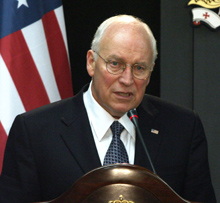Supreme Court Rules Secret Service Agents Have Immunity in Arrest of Cheney Protester

Vice President Dick Cheney speaks
in Tbilisi, Georgia in 2008.
(Northfoto / Shutterstock.com)
Two Secret Service agents who arrested a protester at a Dick Cheney appearance have immunity from suit, the U.S. Supreme Court has ruled.
The protester, Steven Howards of Golden, Colo., had claimed he was arrested in retaliation for First Amendment political speech. In a unanimous decision (PDF), the court ruled for the agents, who arrested Howards after he touched Cheney and then lied about it. Justice Clarence Thomas wrote the opinion for the court.
The case raised two issues, but the court decided only one. The first issue, left undecided, is whether officers may be sued for a First Amendment retaliatory arrest when there is probable cause to support the arrest. The second question, resolved in favor of the agents, is whether it was clearly established at the time of Howards’ arrest that a suit is allowed in such circumstances.
“The ‘clearly established” standard is not satisfied here.” Thomas wrote. “This court has never recognized a First Amendment right to be free from a retaliatory arrest that is supported by probable cause; nor was such a right otherwise clearly established at the time of Howards’ arrest.” As a result, the agents have qualified immunity from suit.
The case stems from a Cheney appearance at a shopping mall in June 2006. Howards entered the line to greet Cheney, told the vice president his “policies in Iraq are disgusting,” and touched him on the shoulder. When questioned by a Secret Service agent, Howards falsely denied the touch. He was arrested and charged with harassment by local authorities, a charge that was later dismissed.
The Denver-based 10th U.S. Circuit Court of Appeals had found that the agents had probable cause to arrest Howards because of the false denial, but that didn’t defeat Howards’ First Amendment claim.
Justice Elena Kagan did not participate in the case. Justice Ruth Bader Ginsburg concurred in the judgment in an opinion joined by Justice Stephen G. Breyer.
Ginsburg said she would not have found qualified immunity if the defendants were ordinary law enforcement officers. Secret Service agents, on the other hand, need to make “singularly swift, on the spot, decisions whether the safety of the person they are guarding is in jeopardy,” she wrote. “In performing that protective function, they rightly take into account words spoken to, or in the proximity of, the person whose safety is their charge.”
The case is Reichle v. Howards.



